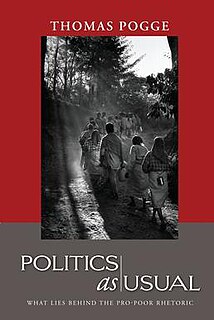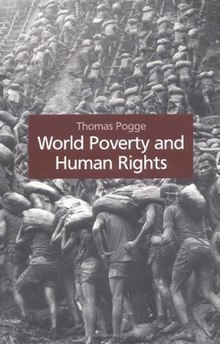
Extreme poverty, deep poverty, abject poverty, absolute poverty, destitution, or penury, is the most severe type of poverty, defined by the United Nations (UN) as "a condition characterized by severe deprivation of basic human needs, including food, safe drinking water, sanitation facilities, health, shelter, education and information. It depends not only on income but also on access to services". Historically, other definitions have been proposed within the United Nations.
Social justice is justice in terms of the distribution of wealth, opportunities, and privileges within a society. In Western and Asian cultures, the concept of social justice has often referred to the process of ensuring that individuals fulfill their societal roles and receive their due from society. In the current movements for social justice, the emphasis has been on the breaking of barriers for social mobility, the creation of safety nets, and economic justice. Social justice assigns rights and duties in the institutions of society, which enables people to receive the basic benefits and burdens of cooperation. The relevant institutions often include taxation, social insurance, public health, public school, public services, labor law and regulation of markets, to ensure distribution of wealth, and equal opportunity.

Citizen's dividend is a proposed policy based upon the Georgist principle that the natural world is the common property of all people. It is proposed that all citizens receive regular payments (dividends) from revenue raised by leasing or taxing the monopoly of valuable land and other natural resources.
Cosmopolitanism is the idea that all human beings are members of a single community. Its adherents are known as cosmopolitan or cosmopolite. Cosmopolitanism is both prescriptive and aspirational, believing humans can and should be "world citizens" in a "universal community". The idea encompasses different dimensions and avenues of community, such as promoting universal moral standards, establishing global political structures, or developing a platform for mutual cultural expression and tolerance.

Structural violence is a form of violence wherein some social structure or social institution may harm people by preventing them from meeting their basic needs.

Thomas Winfried Menko Pogge is a German philosopher and is the Director of the Global Justice Program and Leitner Professor of Philosophy and International Affairs at Yale University. In addition to his Yale appointment, he is the Research Director of the Centre for the Study of the Mind in Nature at the University of Oslo, a Professorial Research Fellow at the Centre for Applied Philosophy and Public Ethics at Charles Sturt University and Professor of Political Philosophy at the University of Central Lancashire's Centre for Professional Ethics. Pogge is also an editor for social and political philosophy for the Stanford Encyclopedia of Philosophy and a member of the Norwegian Academy of Science and Letters.
Human security is a paradigm for understanding global vulnerabilities whose proponents challenges the traditional notion of national security through military security by arguing that the proper referent for security should be at the human rather than national level. Human security reveals a people-centred and multi-disciplinary understanding of security which involves a number of research fields, including development studies, international relations, strategic studies, and human rights. The United Nations Development Programme's 1994 Human Development Report is considered a milestone publication in the field of human security, with its argument that ensuring "freedom from want" and "freedom from fear" for all persons is the best path to tackle the problem of global insecurity.

Poverty reduction, poverty relief, or poverty alleviation, is a set of measures, both economic and humanitarian, that are intended to permanently lift people out of poverty.

Global justice is an issue in political philosophy arising from the concern about unfairness. It is sometimes understood as a form of internationalism.

Philip Geoffrey Alston is an Australian international law scholar and human rights practitioner. He is John Norton Pomeroy Professor of Law at New York University School of Law, and co-chair of the law school's Center for Human Rights and Global Justice. In human rights law, Alston has held a range of senior UN appointments for over two decades, including United Nations Special Rapporteur on extrajudicial, summary or arbitrary executions, a position he held from August 2004 to July 2010, and UN Special Rapporteur on extreme poverty and human rights from 2014-2020.

Redistribution of income and wealth is the transfer of income and wealth from some individuals to others through a social mechanism such as taxation, welfare, public services, land reform, monetary policies, confiscation, divorce or tort law. The term typically refers to redistribution on an economy-wide basis rather than between selected individuals.
Rights-based approach to development is an approach to development promoted by many development agencies and non-governmental organizations (NGOs) to achieve a positive transformation of power relations among the various development actors. This practice blurs the distinction between human rights and economic development. There are two stakeholder groups in rights-based development—the rights holders and the duty bearers. Rights-based approaches aim at strengthening the capacity of duty bearers and empower the rights holders.
The Declaration of Human Duties and Responsibilities (DHDR) was written for reinforcing the implementation of human rights under the auspices of the UNESCO and the interest of the Office of the United Nations High Commissioner for Human Rights and was proclaimed in 1998 "to commemorate the 50th anniversary of the Universal Declaration of Human Rights"(UDHR) in the city of Valencia. Therefore, it is also known as the Valencia Declaration.
Greenhouse Development Rights (GDRs) is a justice-based effort-sharing framework designed to show how the costs of rapid climate stabilization can be shared fairly, among all countries. More precisely, GDRs seeks to transparently calculate national “fair shares” in the costs of an emergency global climate mobilization, in a manner that takes explicit account of the fact that, as things now stand, global political and economic life is divided along both North/South and rich/poor lines.

The global resources dividend (GRD) is a method of tackling global poverty advanced by the philosopher Thomas Pogge. He presents it as an alternative to the current global economic order. Under the scheme, nations would pay a dividend (tax) on any resources that they use or sell, resulting in a sort of "tax on consumption" Pogge's scheme is motivated by the positive duty to alleviate poverty, but also on the negative responsibility of the rich not to use institutions that perpetuate economic inequality. Pogge estimates that a dividend of just 1% could raise $300 billion each year; this would equal $250 for each individual in the world's poorest quintile.

Politics as Usual: What Lies Behind the Pro-Poor Rhetoric is a 2010 book by Thomas Pogge. The book is a discussion on issues of global significance and their relationship to poverty. Politics as Usual is based on previously compiled essays. Pogge's book present an alternate view than the one where "Education, health-care, technology, and political participation are becoming ever more universal, empowering human beings everywhere to enjoy security, economic sufficiency, equal citizenship, and a life in dignity." according to Crop. He presents one where Poverty and oppression persist on a massive scale, one where the affluent states and international organizations knowingly contribute and even benefit from these evils.
The International Resource Privilege is the power to transfer ownership or freely dispose of the natural resources of a country by the authority that countries give to the current leadership or government of that country. The resource privilege exists regardless of how the rulers came to power. While bribery is often illegal, the purchase of these resources by payment to the current government in control is legal. Corrupt leaders sell these resources to generate revenue which entrenches the corrupt government and incentivizing the seizure of power itself. This further handicaps the ability to achieve democracy along with hindering economic growth and the eradication of poverty.
Jason Edward Hickel is an economic anthropologist whose research focuses on ecological economics, global inequality, imperialism and political economy. He is known for his books The Divide: A Brief Guide to Global Inequality and its Solutions (2017) and Less Is More: How Degrowth Will Save the World (2020). He is a Professor at the Institute for Environmental Science and Technology at the Autonomous University of Barcelona, a Visiting Senior Fellow at the International Inequalities Institute at the London School of Economics, and a Fellow of the Royal Society of Arts.

Sentientist Politics: A Theory of Global Inter-Species Justice is a 2018 book by the English political theorist Alasdair Cochrane, published by Oxford University Press. In the book, Cochrane outlines and defends his political theory of "sentientist cosmopolitan democracy". The approach is sentientist in that it recognises all sentient animals as bearers of rights; cosmopolitan in that it extends cosmopolitan political theory to include animals, rejecting the importance of state borders and endorsing impartiality; and democratic in that it aims to include animals in systems of representative and cosmopolitan democracy. It was the first book to extend cosmopolitan theory to animals, and was a contribution to the "political turn" in animal ethics – animal ethics informed by political philosophy.
Eco-cosmopolitanism is a framework developed by Ursula K. Heise in her 2008 book Sense of Place and Sense of Planet. It concerns how local systems related to culture and ecology exist on the global scale, and how one’s sense of place is related to the concepts of environmental imaginations, deterritorialization, and globalization. It is a critique of how localism is inadequate at explaining how humans affect nature, how they understand their surroundings, and what to do about the future of the environment in an ethical context. Instead of thinking of environmental problems and one’s place in the world through their community, it is about thinking of “Indigenous traditions, local knowledge, or national law” in the context of the planet as a whole. It can also be considered a proposed alternative to anti-globalization and regional, grassroots movements. Heise argues that we are all undeniably connected in the modern age, so any solution that is feasible must account for this on the fundamental level. In relation to the world’s ecosystems, the theory complements the idea that ecosystems do not exist as isolates, they instead overlap because globally, they face similar if not the exact same problems. Thus, Heise theorizes, humans have a duty to all ecosystems, not just the one that they are a part of.











